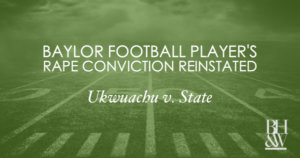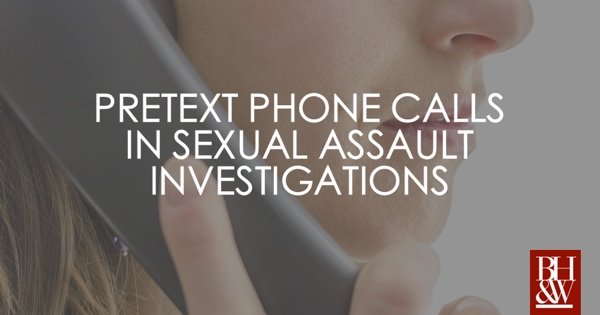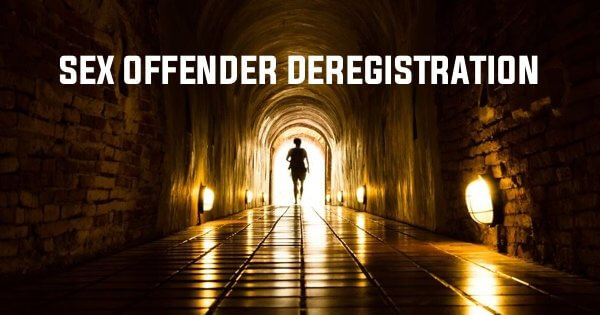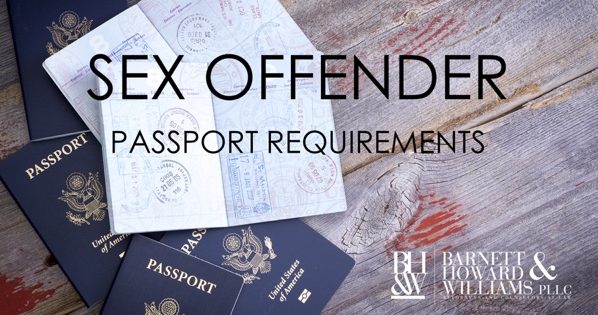 Baylor Sexual Assault Case: Ukwuachu v. State (Tex. Crim. App. 2018)
Baylor Sexual Assault Case: Ukwuachu v. State (Tex. Crim. App. 2018)
Anyone who lives in the state of Texas has heard about the sexual assault scandal at Baylor. One of the cases that triggered the investigation of how Baylor handles sexual assault accusations recently took an interesting turn. Former Baylor football player Sam Ukwuachu was found guilty of sexual assault in 2015. He has been fighting that conviction ever since. The prosecution achieved this conviction with the help of text messages sent from the victim to her friend. Ukwuachu’s defense attorney argued that earlier text messages sent to the same friend would help to show the complete nature of the relationship and could be compelling evidence that the woman consented to sex. However, the trial court decided that those text messages were inadmissible under Texas’ Rape Shield Laws and Ukwuachu was ultimately convicted. The process did not stop there.
Ukwuachu Appealed the Sexual Assault Conviction
Ukwuachu appealed his conviction arguing that the earlier text messages should have been admissible and the trial erred by refusing to admit them. In 2017, the 10th Court of Appeals sided with Ukwuachu, reversing the conviction and ruling that the trial court abused its discretion by refusing to admit the messages. The court reasoned that under Texas Rules of Evidence 412 and 107, the messages should have been allowed even though Ukwuachu’s attorney did not present the evidence under Rule 412.
Texas Court of Criminal Appeals Overturns the Lower Court, Reinstates Conviction
This week, Texas’s highest criminal court issued its opinion on the case. Ukwuachu v. State (Tex. Crim. App. 2018). The CCA held that the 10th Court of Appeals erred when it reversed the conviction. In a plurality opinion, the CCA held that the trial court did not abuse its discretion in not allowing the text messages.
Texas Rule of Evidence 412 and 107
Rule 412 is also known as the “Rape Shield” law. It is a rule of exclusion that prevents the admission of evidence of a sexual assault victim’s “past sexual behavior.” TEX. R. EVID. 412(a)(1). It also makes any evidence in the form of depictions of specific instances of the victim’s sexual conduct inadmissible. TEX. R. EVID. 412(a)(2). However, it has many exceptions.
The exceptions the TRE 412 include when the evidence:
- is necessary to rebut or explain scientific or medical evidence offered by the prosecutor;
- concerns past sexual behavior with the defendant and is offered by the defendant to prove consent;
- relates to the victim’s notice or bias;
- is admissible under Rule 609; or
- is constitutionally required to be admitted
Rule 107 is known as the Rule of Optional Completeness. Rule 107 states,
“[w]hen part of an act, declaration, conversation, writing or recorded statement is given in evidence by one party, the whole on the same subject may be inquired into by the other, and any other act, declaration, writing or recorded statement which is necessary to make it fully understood or to explain the same may also be given in evidence, as when a letter is read, all letters on the same subject between the same parties may be given.”
Under this rule, there are two avenues to the admission of evidence. The first is if partial evidence is introduced, any remaining part of that same evidence may be introduced so long as it is on the same subject. Second, other evidence, even evidence that is not a part of what has already been introduced, may be introduced if it is necessary to explain or help the trier of fact fully understand the part that was introduced. Basically, the courts do not want the parties to present a false picture to the jury by selectively presenting pieces of the whole.
Rule 107 was the focal point at the trial court regarding the admission of the “other text messages.” The defense argued that the order messages were necessary to help the jury to fully understand the messages that were already in evidence. The state (and the trial court) disagreed.
Why Was the Conviction Reinstated?
The CCA explained that at the trial court, neither party discussed Rule 412 and how it would apply to the text messages. Instead, both the state and the defense argued based on Rule 107. Accordingly, it was inappropriate for the 10th court to decide the appeal using Rule 412. When analyzing Rule 107, the Judge noted that the text messages could have been interpreted in multiple ways. They could have been part of the same conversation, they could have been necessary to explain the messages already introduced to the jury, or they could have fallen into neither category, making them inadmissible. The trial court determined that the messages fell into neither category and were inadmissible. The CCA explained that this was not error because it fell under the trial court’s discretion. Judge Walker wrote:
Arguably, both parts of the text stream are within the same conversation, because a text message conversation can span a long period of time and the messages at issue in this case were all sent on the same night over what was, at most, a one hour and forty-five minute time period. On the other hand, the earlier text messages that defense counsel sought to have admitted appear to be during a time when the victim was traveling with Appellant to Appellant’s apartment, and the later text messages that the State introduced appear to be during the time that the victim was actually at Appellant’s apartment, including the time after the assault occurred. This latter interpretation is the one that the trial court made during the hearing.
A court only abuses its discretion if its decision lies outside the zone of reasonable disagreement. Since the trial court’s decision in this case fell within a reasonable zone of disagreement, its decision to deny the introduction of the text messages should stand. This means that Sam Ukwuachu’s original conviction is reinstated.
The case was remanded back to the lower court.










